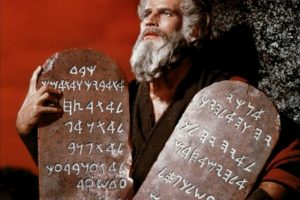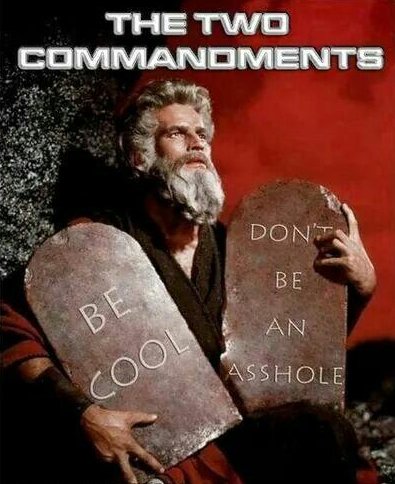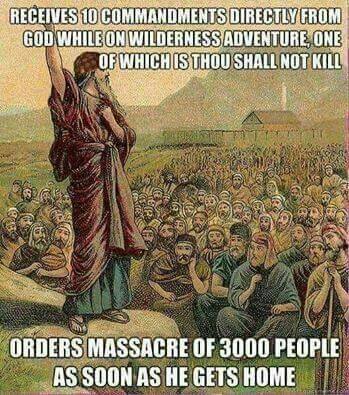Why, in the light of Jesus, we no longer need to follow the ways of Moses
Some might be offended by this, but from very early on in my Christian walk, I have considered Moses to be a complete and total prat.
In fact, I once voiced that opinion (in fact, my words were “…actually, I think Moses was a bit of a wally”), and was told that I would, one day, have to answer for that. Hmm, yeah, right 😉
Well, here I am doing it again, and on a world-wide platform, no less.
I mean, he was a volatile man with a terrible temper; a murderer; a religious cult leader (he had absolute power and authority, that he claimed were ‘God-given’); and he was the equivalent of an organised crime leader in that he had a bunch of killers at his beck and call. Consider the episode of the Golden Calf. If you haven’t read the story, it’s in Exodus 32. Moses comes down off that mountain and finds the people worshipping an idol – a golden calf – and, despite pleading with God for the people with some compassion, Moses ends up in a total radge and gets a bunch of thugs to go through the camp killing people indiscriminately. Not the kind of bloke you’d want to go down the pub with for a pint. And this is Moses the ‘Servant of God’ (Rev 15:3, Heb 3:5, Num 12:7 et al) we are talking about here, remember.
Then, on another occasion (Numbers 15:32-36), Moses decides that ‘God told him’ to kill (or at least, to get his thugs to kill) some random bloke who may even have been an innocent foreigner who just happened to break some Sabbath law that he maybe didn’t even know about. And then the very next verses in that Numbers passage go on about some pretty little tassles with coloured thread that you can look at and feel good about. I mean talk about dysfunctional religion… I really don’t like some parts of the Bible, and Numbers is the pits, it really is. There are some nuggets and gems in there, but you have to dig pretty deep – and survive all the other tripe in there – in order to find them.
And supposedly Moses wrote that book, although I understand that most scholars nowadays do not hold this to be correct. But if Moses had written it, it wouldn’t surprise me. It’s right up his street. If you were going to give the Bible an enema, Numbers is where the tube would go. Or maybe Deuteronomy. Anyway, I could go on for ages quoting examples of how Moses justified himself by effectively saying ‘God told me to do it’ and essentially displayed all of the characteristics of an abusive church leader of one of today’s way-off-beam churches, but at a time in history that was at least three thousand years ago. It seems that, in some quarters at least, little has changed. In some ways, it’s quite worrying: I have actually heard and read many purported men of God put forward the idea that Moses is a ‘model’ leader. Actually, it’s Jesus Who models the ideals of leadership qualities, not Moses. If you are ‘under’ a leader who claims Moses as his model, get out of there fast! Run as far as you can, as fast as you can! It’s especially scary that the words of Moses and violent stories from the Old Testament (especially the story of David and Goliath) are used far more to indoctrinate educate children in Sunday School than are the words of Jesus. But I digress.
Suffice it to say that I see Moses, and the religious views of the Old Testament (OT) inspired by his teachings, to be the archetypal example of how not to pursue faith in God. Essentially, Moses tried Law and it didn’t work (Rom 3:20; Gal 2:16). And in fact the huge take-home message of the OT is this: Religion based on rules and regulations does not work. Sure, the main thing that the OT does is to lead us to Jesus, but one of the primary ways in which it does this is to show us the futility of Law-based religion.
And, while I have learned valuable lessons from Moses, especially on the how-not-to-do something level, I have recently come to a further conclusion which sheds a lot of useful light on how we interpret the older parts of the Bible today, and try to apply its ‘teachings’ as principles in our modern era.
You see, I realised that it is completely unfair for me to judge Moses by today’s standards; that was just the way people were back then, even (and especially?) the ‘pious’ ones. Moses was on a different part of his spiritual walk, in an entirely different time, world and culture from ours, in an utterly different and indeed completely alien era, when their belief systems were very, very different from those of anyone today. Or so I would hope, at any rate. Those people were only just beginning to adapt to the idea of the One True God being different from the gods of other nations, and not simply being just another tribal deity. So, Moses was a man of his time. True, I still think he was a prat, but he was a prat of his time. Let’s give him the benefit of that.
In fact, the Hebrew people of that time too were also a product of their times and circumstances. Everyone else – all the other nations: the Philistines, Hittites, Jebusites, Midianites, Edomites, Amalekites, Moabites, Egyptians, Amorites, Canaanites, Babylonians, Assyrians – had vicious gods; the Hebrews thought theirs wasn’t much different, at least at first, until His continued revelations to them gradually showed them more of what He is really like. And so they said things like ‘God told us to [perform an atrocity]’ whereas actually it was just the way they did things back then.
Anyway, from the Old Testament, we now jump forward to the New Testament (NT). On the Mount of Transfiguration (Mt 17:1-8; Mk 9:2-8; Lk 9:28-36), Jesus’s disciples observed Him in the company of the previous ‘greats’ of the Jewish faith – Moses and Elijah. It is widely agreed in this context that Moses represents the Law, while Elijah represents the Prophets. And so when Peter says, “Let me make three tents for you all”, Moses and Elijah disappear and the voice of God says, “This is my Son, whom I love; with him I am well pleased. Listen to him!” The timing of this announcement is important. Whereas Peter wants to give Jesus equal standing with Moses and Elijah – which in his eyes, would have been an honour indeed – by making three equal tents for them, the simultaneity of the three events of Peter’s offer of the tents, the disappearance of the ancient guys and the words of the Voice of God are effectively saying, ‘No! These guys, and what they represent, are not important anymore; from now on you need to listen to My Son, Who is not equal to Moses and Elijah, but is in fact much, much greater‘. As of that day, the Law and the Prophets have been superseded, and they are no longer the way in which God relates to people. And while Moses and Elijah generally got their way through religious bullying and genocide, the way of Jesus was diametrically opposed to those kinds of methods.
In this pivotal event in the Jesus story, God was saying, “Look, from now on we’re doing things differently. We’re no longer doing things using the crude and often barbaric methods of mere humans, no matter how much they are in My favour; no, now we are doing things My Son’s way”. Not only this, but also that Jesus was – and is – the perfect revelation of God to humanity. ‘He who has seen Me has seen the Father’ (Jn 14:9). In fact, one of the major, if more subtle, of the story arcs of the Scripture is that of humanity’s changing view of God, right from being just like all the other vicious tribal gods of the region, right up to, eventually, Jesus showing us what the Creator is really like. And there is no need to assume that this arc does not continue to this day; God is continually revealing His nature to humanity in ever-increasing measure, and still this is through Jesus Christ.
So, yes. Moses , in addition to being an utter prat, was also a mass-murderer, a thug and a cult leader. I accept this and I accept why he was like this.
But what we are saying here is that, since the coming of Jesus the Anointed One (which is what ‘Christ’ means), Moses has been superseded.
In fact, he has been completely superseded.
The mature, revealed and fully-developed view of how we relate to God is now through Jesus, and no longer through Law.
This is the testimony of the entire New Testament; indeed, this is why the Testament is known as ‘New’. John begins his Gospel with it: “For the Law was given through Moses; Grace and Truth came through Jesus Christ” (Jn 1:17); the Transfiguration account states it, as we have already seen; and St. Paul continues the claim with his assertions that we are no longer under Law, but under Grace, in Rom 6:14 and several other similar passages. Moses is no longer relevant, except in certain circumstances where believers preaching the Gospel need to relate to people who are still ‘in’ the old system of Law in order to save them from those systems (see 1Cor 9:19-23 for examples of this tactic).
So, what this means in practice is that yes, we can allow that Moses was a product of his time, and excuse his behaviour that way. But it also means that we neither can, nor should we, try to import the cultural attitudes and laws of Moses’ times into our present day faith and religious structures; it just doesn’t work, and most of it would be illegal nowadays anyway. Especially all that crap about killing the donkeys… We just shouldn’t be trying to imitate the way they were back then, a) because Jesus has superseded it all with His way of Love, and b) because it is no longer relevant and is indeed a step in the wrong direction, and c) who wants to be like Moses, for goodness’ sake? A good read of the book of Hebrews will reveal that the Old Covenant has, in Christ, already been superseded by the New Covenant, and a major part of this succession is that the Law of Moses, and all the superstition, savagery and religious manipulation that Moses represents, is gone forever and is no longer relevant to the believer.*
In fact, the entire burden of fulfilling the Law has been borne by Jesus, however that works. Jesus said, “I did not come to abolish the law of Moses or the writings of the prophets. No, I came to accomplish their purpose” (Mt 5:17 NLT). And, once their purpose had been accomplished, they are no longer necessary, except in the vestigial sense I mentioned above. When we live a life in the Spirit, all the burden of the Law is taken care of and is not only fulfilled by Jesus and Him living His Life through us by His Spirit, but is actually made obsolete (Heb 8:13). This is what makes it a New Covenant; it’s no longer a dead covenant but in fact a ‘new and living Way’ (Heb 10:19-23). It’s also the primary reason why we need to read the Scriptures – all of them – through the lens of Christ, Who embodies and demonstrates Grace and Truth, rather than the lens of Moses, who represents the Law. If we deny this, then we deny our liberty from the Law and are essentially no longer aware of the benefits of that liberty; indeed we have ‘fallen from Grace’ (Gal 5:4)
No, the whole burden of our having to keep the Law is now indeed obsolete. This is because it is now Life in the Spirit that makes us free to follow Jesus and live His Life. In my article, Licence to Sin, I explain how the life in the Spirit means that we can live sin-free and walk freely with God.
Wouldn’t you like to be in that position? Wouldn’t you like to be free of the influence of others’ judgement on your life and actions, pretending to be in the name of God? “Whoever claims to live in Him must walk as Jesus did” (1Jn 2:6) This is not a test of true faith, nor is it a command. This is a simple statement that those who live in Him must walk as Jesus did because that is their natural tendency. That’s just the way things are, it’s saying. “As He is, so are we in this world” (1Jn 4:17). This is the nature of the New Creation. This is a statement of fact.
And it’s a statement of fact about You. Yes, you reading this. This is who you are. You are in Christ. Not in Moses, nor indeed in ‘Adam’, but in Christ.
And there is no going back. Once we have been included in Christ, the life we live is not any longer our old life, but is the New Life in Christ! (Gal 2:20)
Oh, hallelujah! Why be all tied up in Moses any longer? Step into Christ, into His liberating death and His Life-giving Resurrection, and His joy-giving Spirit. And live, live, live!
Yes, Moses may well have been a prat. But you are not in Moses; you are in Christ, and He is the One Who is in you.
Rejoice!
*I make the distinction between believer and unbeliever here, because Paul says that ‘through the Law, we become conscious of sin’ (Rom 3:20b). Once a person believes in Jesus, that person no longer needs to be ‘conscious of’ or indeed worry about sin at all, ever again, because it has all been dealt with at the Cross, and the believer has appropriated that for themselves. This is part of what it means to be a New Creation in Christ. If any man be in Christ, he is a new creation; the old has gone, the new is come! (2Cor 5:17)
Top picture in this article is an obvious photoshop of legendary actor Charlton Heston as Moses in the 1956 movie The Ten Commandments. My apologies to the late Mr. Heston for my shredding of the character he played 😉



Love this.
😀